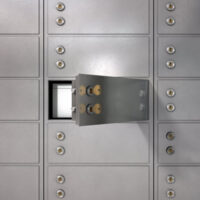Should I Keep My Original Will In A Safe Deposit Box?

When it comes to probate, original is always best. That is to say, in order to open a probate estate when the decedent left a last will a testament, it is usually necessary to file the signed original document with the court. In most cases, the executor or personal representative named in the will is the person who files the original.
But let’s back up a bit. Say you have just made a will as part of your own estate plan. Given the importance of filing an original will in probate, how will you keep that document safe until the time comes? Many people just assume the best option is to keep their original will in a safe deposit box. After all, what could be more secure than a locked bank vault?
The problem is that a safe deposit box can be too safe. A safe deposit box is a space that you lease from the bank or other institution. As the lessor, you are the only person legally entitled to access that box. So if someone shows up after you die claiming to be your executor, that alone will not guarantee them access.
Now, Florida law does make clear provisions for a personal representative to access a decedent’s safe deposit box. But this right of access only applies after the executor is appointed by the probate court. And that can only take place after the original will is filed for probate.
You can see the paradox here. You need the original will to be appointed personal representative. But the original will is locked in a safe deposit box that cannot be accessed until a personal representative is appointed.
Now, you might be thinking, “What if I gave someone my power of attorney before my death? That would give them the authority to open the box on my behalf.” The flaw in this argument is that a power of attorney terminates upon your death. From a legal standpoint, once a person dies, their probate estate assumes responsibility for their property. (Many people also keep their signed, original power of attorney with their will, in which case it may also be locked inside the safe deposit box their agent is trying to access.)
Where Should I Keep My Will?
There are a number of more practical alternatives to a safe deposit box for the safekeeping of a will. For example, you can simply keep the documents in a fireproof safe or lockbox in your house. (Make sure you give a duplicate key to your executor or another trusted person.) You can also execute a duplicate set of original estate planning documents and leave one set with your attorney for safekeeping.
If you have additional questions about this or any related topic it is best to speak with an experienced St. Petersburg estate planning attorney. Contact Legacy Protection Lawyers, LLP, today to speak with a member of our staff.
